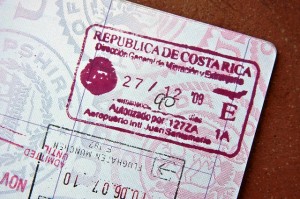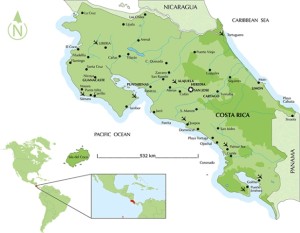Are you in the midst of planning your Costa Rica vacation and need some quick answers to commonly asked questions? From entry requirements to local driving conditions and drinking water, here’s what you need to know before packing your bags.
Book your luxury vacation at a fraction of the price of a luxury hotel!

Q. What are the entry requirements?
For citizens of the United States, Canada, and most EU countries, Costa Rica immigration requires a valid passport and proof of onward travel for entry. Most tourists are granted a 90-day stay upon arrival. If you are flying in on a one-way ticket, airline officials will ask for onward travel documentation, in the form of a bus or airline ticket.
Q. When is the best time to travel in Costa Rica?
That depends on your personal preferences, but in terms of the weather, if you want guaranteed sunshine, the dry season runs from mid December through April. This is labeled Costa Rica’s ‘high tourism period’ as it’s the most popular time for most vacationers. The rainy season (a.k.a. green season) months of May through November typically have fewer crowds and discounted rates on Costa Rica vacation rentals and hotel stays. Both seasons have their perks, and it rarely rains continuously in the green season, so visitors have plenty of opportunities for outdoor adventures.

Q. How are the driving conditions and should I rent a car?
The majority of Costa Rica’s major highways are in good shape, and driving here – just like that in any big city – requires a dose of patience. The best advice is to stay alert for unexpected surprises and avoid long trips at night when visibility is compromised. A GPS system comes in handy for navigating poorly signed parts of the country, and a car rental is definitely recommended for travelers who want to get off the tourist path and explore on their own. Most car rental agencies will include a GPS for a small daily fee. Gasoline prices are currently hovering around $5.50 a gallon.
Q. Are there any medical concerns or mandatory vaccines?
Unless you’re flying in from certain South American or African countries, there are no mandatory vaccines to enter Costa Rica. The country boasts one of the best health care systems in Latin America and has several first-class hospitals in and around San Jose and Liberia, with English speaking staff. The only health concern is that of Dengue Fever, which is a virus transmitted by mosquitoes. Dengue is not especially prevalent and can be prevented with liberal use of insect repellent.
Q. Do I need to exchange money and can I use my credit cards?
The local currency is known as the colon, and the exchange rate is currently around 500 CRC to 1 USD. Most tour operators, restaurants, hotels and business in major tourist hubs accept U.S. dollars, but the rate may not be as favorable. You can withdraw both dollars and Costa Rica colones using your ATM card from banks throughout the country. Additionally, most businesses accept Visa and Mastercard, but it’s best to verify payment methods beforehand.
Q. Can I drink the tap water in Costa Rica?
Yes, the tap water is safe to drink throughout the country unless you see signage that indicates the water is not potable. If you have a sensitive system or are traveling to very remote areas, you may consider purchasing bottled water to play it safe.
Q. Is there an exit tax at the airport?
Whether you’re departing from the Liberia (LIR) or San Jose (SJO) international airports, you will be required to pay a $28 departure tax before checking in for your flight. This tax is mandatory, and can be paid in cash, with dollars or colones, or by major credit card. If you are leaving the country overland or by ocean liner, this exit tax is waived.

 +1 888-818-2097
+1 888-818-2097
 +506 8932-4731
+506 8932-4731